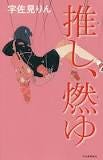Idol, Burned

『推し、燃ゆ』宇佐見りん
Idol, Burned, by Rin Usami
Rin Usami won the Akutagawa Prize for 『推し、燃ゆ』 (“Idol, Burned”) at the age of 21, as a second-year university student. In 2019, she won the Mishima Yukio Prize for her debut novel 『かか』(Kaka), becoming the youngest person ever to win this award. “Idol, Burned” is narrated by Akari, a high school student when the story begins. This first-person narration thrusts the reader into the uncomfortable position of having to see the world through the lens of her fixation on an idol and its mental and even physical effects. But the brilliance of this book is that, in less than 150 pages, Usami is also able to sketch vivid portraits of Akari’s mother and sister, and even the idol himself.
Like the narrators of Sayaka Murata’s Convenience Store Woman and Natsuko Imamura’s The Woman in the Purple Skirt, Akari doesn’t fit in and finds it difficult just to get through the day. A doctor diagnosed her with two conditions, which comforted Akari at first, but she no longer takes the medicine and doesn’t bother going to appointments. Everything seems difficult to her, a weight pushing her down. Talking to someone means you have to exert the muscles that will lift the corners of your mouth into a smile, just going through your day leaves you grimy so you have to take a bath, your nails grow and must be cut. Akari has to gather up all her energy just to accomplish the bare minimum, and yet it’s never enough—her will and physical strength give out before she’s done what she’s supposed to do.
The only thing Akari has energy for her is her “oshi” (the 推し of the title, referring to the idol she supports), the singer/songwriter Masaki Ueno who is a member of the group Mazama-za. Her first memory is of watching Masaki Ueno play Peter Pan when she was four. Her life seemed to start the moment he flew above her head, suspended on wires. But she didn’t become a fan until much later, when she was in high school and found an old DVD with the Peter Pan recording on it. She related to his desire to never grow up; his urging to escape to Neverland resonated with her.
Since then, Akari has accumulated over 20 files full of everything he has said on the radio, TV and elsewhere, all carefully transcribed and written down. She analyzes every word he says and posts her thoughts on her blog. This gives her a community of sorts. These fans live in different places and are different ages, but they greet each other when they wake up, complain about Mondays as they commute to work or school, and have online gatherings on Fridays when they post pictures of their idol and comment until late into the night.
Usami has spoken in interviews about the research she has done on fans, reading blogs and comments in chat rooms to learn about fandom in Japan. As she describes through Akari, some fans fawn over every action their idol makes, others say a true fan must know when to criticize. Some have romantic feelings for their idol and don’t care about their artistic work, while others venerate their idol’s work and don’t care about scandals; many just love the community that fandom gives them. Akari doesn’t want anything in return for her adulation. In fact, being separated by the screen on her TV or cell phone or the distance to the stage was gentle and forgiving. Nothing she could do could either hurt the relationship or draw them closer.
Akari has to work because being a devoted fan is expensive (for one thing, she always buys three sets of all Mazama-za’s cds—one to save, one to listen to and one to loan), but it is torture for her. Akari can’t process sudden changes or do more than one thing at a time, so working at a busy izakaya is just one obstacle after another. For example, when her boss isn’t around, a customer asks for a little extra in his drink on the house, but she can’t adapt on the spot; instead, she checks the price list and tells him the cost for a larger serving. And the more her boss tells her to calm down, the more flustered she gets, until eventually she feels like her circuit breaker is overloading and shutting down.
The first-person narrative style means that we see events through Akari’s eyes and have to guess at the other characters’ feelings based solely on her throwaway observations and other "clues" she accidentally gives us. From Akari’s perspective, her sister goes from understanding and protective to fed-up and angry in one disorienting instant, but the amazing thing about reading is that you can hold on to multiple viewpoints at the same time--we are not trapped in Akari's head, but can merge her viewpoint with our own independent perspective to imagine how her family and boss may feel. Akari’s sister had tried to coach her through homework and shelter her from their mother’s anger, but becomes frustrated when Akari insists she is doing her best when the only thing she works hard at is following her idol. It gets to the point that she can no longer even bear to live with Akari anymore.
Akari’s mother initially seems unfeeling and cold toward her daughter, but Usami fills out the picture to create a more complex character, deserving of sympathy. Her own mother had constantly rejected her, and yet had demanded that she stay in Japan instead of going with her husband when he was posted overseas. She is dealing with a querulous, selfish mother in poor health and a troubled daughter with an obsession she can’t understand. Akari may offhandedly mention her mother’s debilitating headaches and late-night conversations with her older daughter, but it is clear to the reader that the entire family is struggling, while Akari lives in her fantasy world. Usami’s laundry list of all the sources of the mother’s stress—Akari quitting school, the increase in electricity rates, her aging mother’s deteriorating health, a new doctor who is not friendly enough, her employee’s inconvenient pregnancy, the plants on the verandah next door growing onto her own verandah, her husband’s infrequent visits home, the handle that had fallen off of a pot she had just bought—is almost funny in its pairing of the quotidian with the serious, but it left a clear picture of an overwhelmed woman with no one to lean on.
Usami explores the loneliness of the pop idol too. In an interview, Masaki relates how he realized from a young age that most people couldn’t differentiate between his fake laugh and a real laugh, and what he was thinking didn’t seem to get through at all. Not only did fans not understand, but the people in his immediate environment didn’t understand him. And so he writes songs, in the hope that maybe someone out there will get it.
Things that were easy for others are hard for Akari, but supporting Masaki has become her core, her backbone. But when Masaki hits a fan and faces criticism and rage online, Akari begins to fall apart. She desperately strips herself of physical strength, money and time to devote herself to her cause. It is almost an act of purification, and in exchange for pain, she is given a reason for existing, but even this is now at risk.
It seems inevitable that the band will fall apart, but while Masaki might be ready to leave Neverland, I couldn’t imagine how Akari would survive it. By the night of the last concert,
Akari’s grandmother has died and she is living alone in her house. Returning home after she has finally realized that Masaki is no longer available to her, she is able to see the mess she has created—clothes, hair bands, chargers, empty tissue boxes and ramen cups.
Ending the novel with an episode freighted with symbolism, Usami leaves us with a shocking scene but one that might hint at a little hope for Akari. Confronted by the mess she has made in her house, she begins by picking up the cotton swabs spilled all over the floor. She is on all fours, head down, picking them up carefully just as family members pick out bone fragments from the ashes after the cremation of a relative. She reflects that being on all fours seems to suit her—she doesn’t seem able to stand on her own two feet so for now she will crawl.

Source: Asahi Shimbun
Rin Usami gave a long interview to the Asahi Shimbun's book page, which can be read here.



